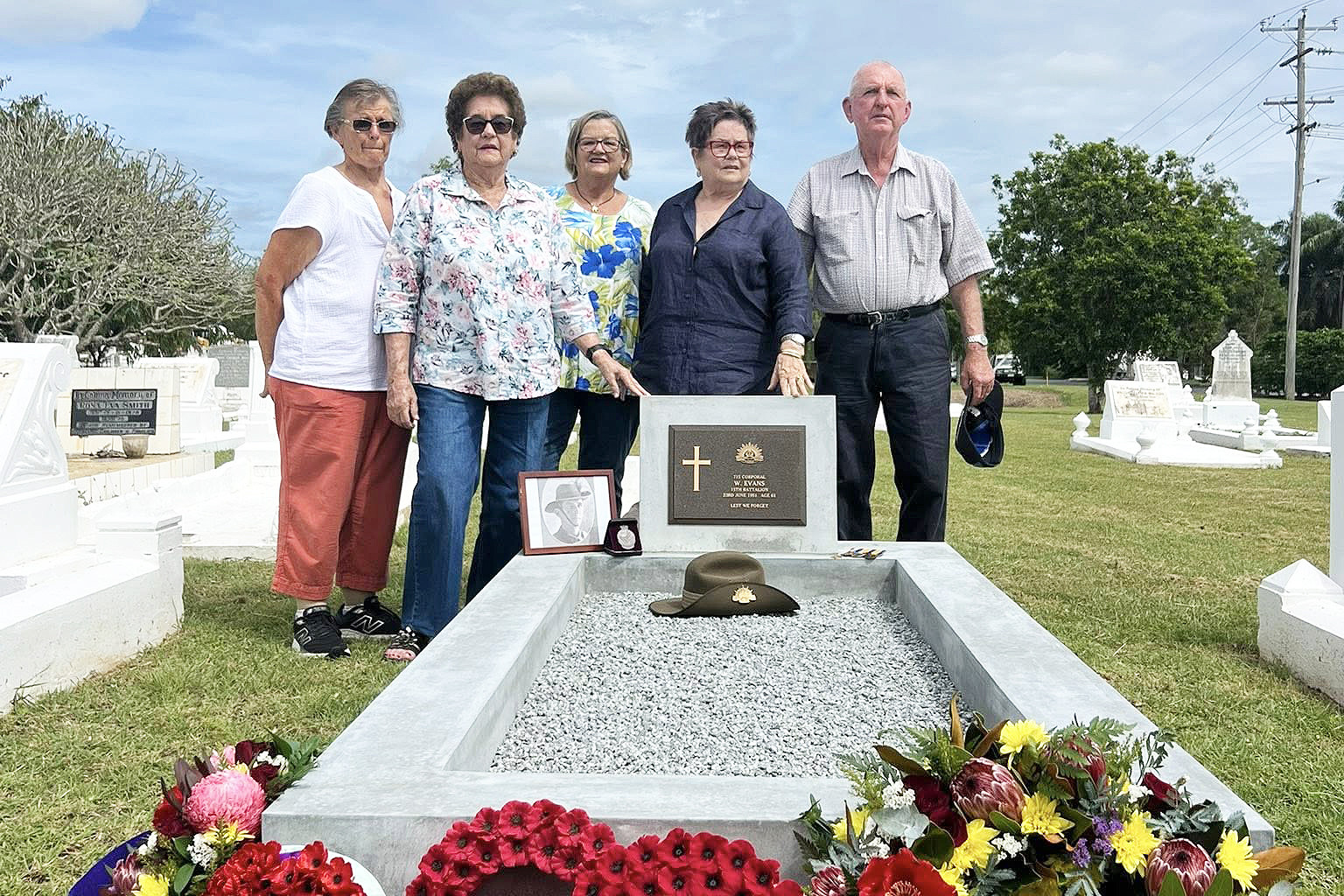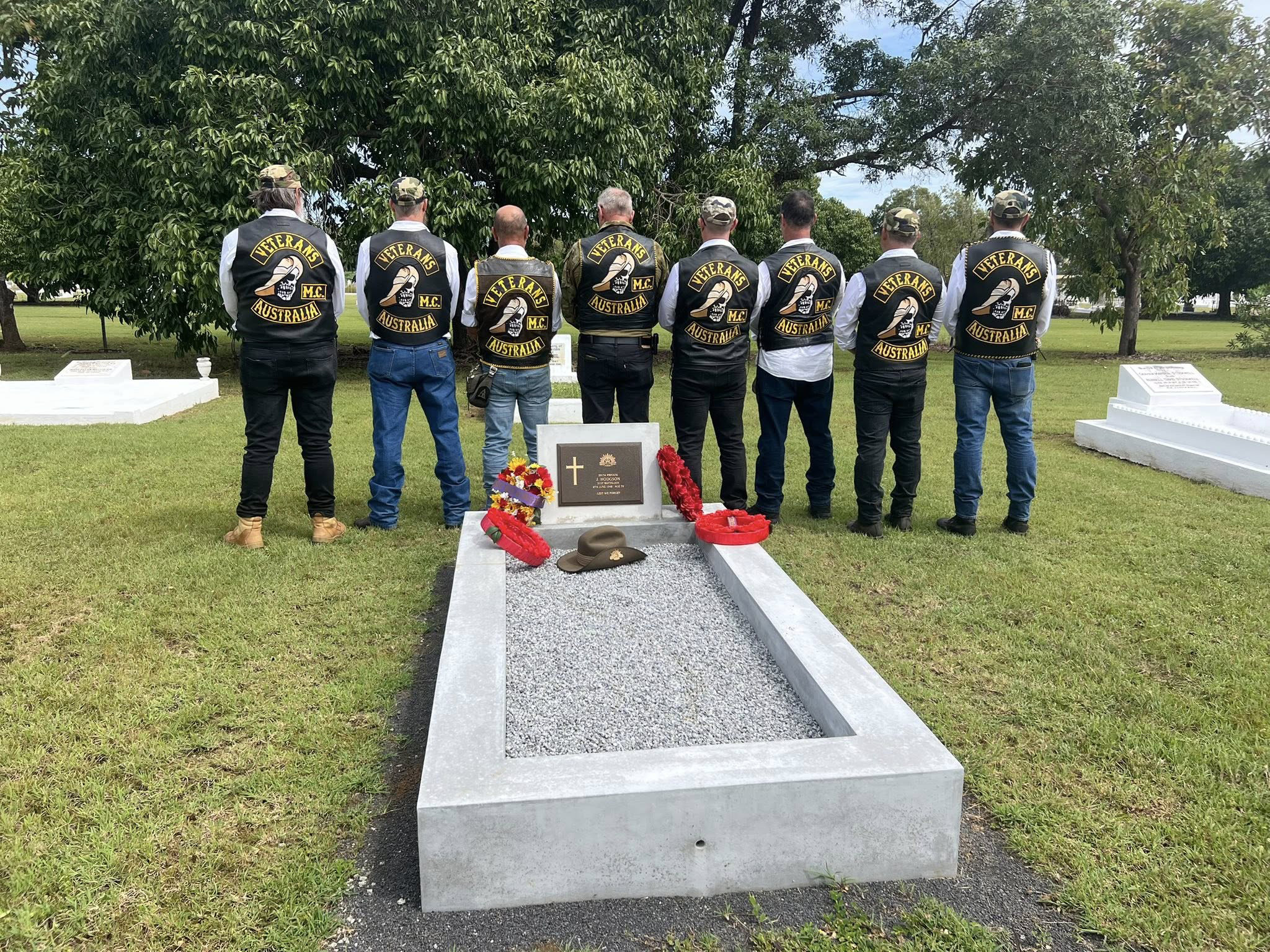Community & Business
22 April, 2025
Diggers honoured with official graves
TWO World War 1 diggers who died more than 70 years ago finally have official resting places, with a special ceremony at the Mareeba Pioneer cemetery held this month to unveil the graves, attended by relatives and veterans.

Corporal William (Wally) Evans and Private John Hodgson were both awarded the 1914-15 Star, British War Medal and the Victory Medal for their military service, but when they passed away in Mareeba, their graves were left unmarked.
A few months ago, local historian and leader of the refurbishment of the pioneer cemetery, Michael Musumeci, was approached by two descendants of the diggers in an attempt to rectify their unmarked graves to official war graves.
Mr Musumeci took on the challenge, researching the diggers’ stories, then applying to the Office of the War Graves, and seeking approvals from Mareeba Shire Council, before arranging for the graves and plaques to be officially constructed.
On 12 April, a crowd of around 50 gathered at the cemetery, including descendants of the Evans families, members of the Patriots, Vietnam and Veterans Motorcycle Club, the community and a lone piper to honour and remember the two World War 1 veterans.
During the official service, both diggers’ lives were told.
Corporal Evans, was born on 15 Feb 1890 in Northumberland, England, coming to Australia in 1911 where he worked as a sheep shearer in Aramac, Central Queensland when the Great War broke out.
At 24, he enlisted in the Australian Imperial Forces in late 1914 and was attached to the 5th Light Horse. He left Australia in February 1915 heading for Gallipoli, via Egypt. He sustained a gunshot wound to his thigh whilst in action at Anzac Cove on 28 July 1915 and was evacuated to Mudros to recover.
The following month he returned back to the Gallipoli Peninsula but was hospitalised months later with a serious bout of pyrexia, causing him to be evacuated to England. Here, he remained in hospital suffering from enteric fever and paratyphoid, totalling 73 days under treatment.
Recovering from sickness, he transferred from AIF Headquarters in Salisbury, London, and was taken on strength with the 3rd District Headquarters.
Late November 1916, he proceeded to France but in early January 1917, was back in hospital for appendicitis in Wimereux. Whilst in France, he transferred to the Anzac Provost Corps, and promoted to T/Corp until he was evacuated sick to hospital in July 1918.
He returned to Australia in late January 1919 and was discharged months later.
William Evans passed away on 23 June 1951 at the Mareeba District Hospital aged 61.
John Hodgson was born in 1869 in Durham, England. At the age of 43, John was working as a labourer, before he enlisted at Blackall, Queensland in January 1915, and was a Private to D Company, 42 Battalion AIF in Feb 1916.
On 16 May 1916, he left Australia aboard HMS “Ceramic” at Port Laid, remaining there for a month. On 6 June 1916, he left on the “Franconia” at Alexandria and disembarked at Plymouth 10 days later.
On 5 September 1916, he left for France, and joined his 31st Battalion AIF 6th Reinforcements, until 12 December 1916 when he was sent to a Field Hospital, reported sick.
He rejoined the unit from hospital in March 1917, but was still suffering ongoing bouts of severe bronchitis and rheumatic fever that he never got over during his service. He was admitted to numerous hospitals until he was evacuated to England in August 1917.
Due to his ongoing poor health, the Medical Board recommended he was unfit for general service, suffering a permanent disability, inflicted whilst in service. He returned to Australia in late 1917.
Very little is known of the life after his war service, but records indicate he resided in Mareeba, for a number of years, along Walsh Street, prior to his death on 8 June 1948.
“Sadly, there are no relatives for Private Hodgson in Australia, so it was inspiring to see the veterans, including members of the motorcycle club, carrying on the role of looking after one of their mates, after so many years had passed,” Mr Musumeci said.
The Ode was officially recited, and the crowd was reminded of the events of Gallipoli during the service which was ended with the Last Post, a blessing and one minute silence observed. Family members and veterans then unveiled the graves of both diggers and laid wreaths.
“This was another successful project for the Mareeba Pioneer Cemetery that brought a sense of closure to many relatives, and also a welcomed addition to the cemetery,” Mr Musumeci said.
“Our iconic pioneer cemetery is now a place of respect, dignity and remembrance, and really something Mareeba and the many who visit should be very proud of.”



